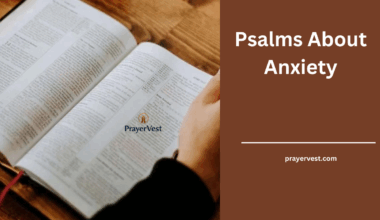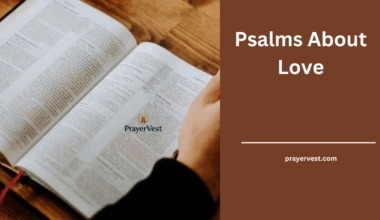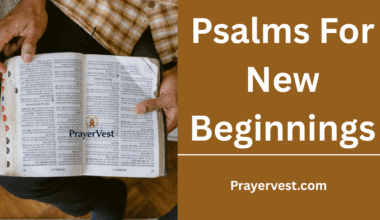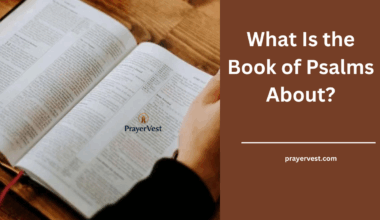The Book of Psalms is a precious mirror that reflects the human soul throughout Scripture, including its struggles, victories, and intense desire for purity. Psalms for spiritual cleansing provide timeless words that help us approach God for purification when our hearts feel tarnished by sin, distraction, or emotional burdens.
These age-old prayers help us give ourselves over to God’s sanctifying activity and arouse a desire for interior renovation in addition to calming the spirit. Realignment with God’s truth, beauty, and presence is what spiritual cleansing is all about, not just getting rid of sin.
David, the psalmist most frequently linked to spiritual reflection, serves as an example of what true repentance and purification entail. A man devoid of pretension is seen in Psalms 51 and 32, pleading for not only forgiveness but also a pure heart and an unwavering spirit.
His openness shows that God’s grace seals the cleaning, which begins with confession and continues with surrender. The Psalms lead us into a rhythm of sincere introspection, profound repentance, and joyful reconciliation. During times when we are feeling guilty or just want a more profound spiritual rejuvenation, they speak to the soul.
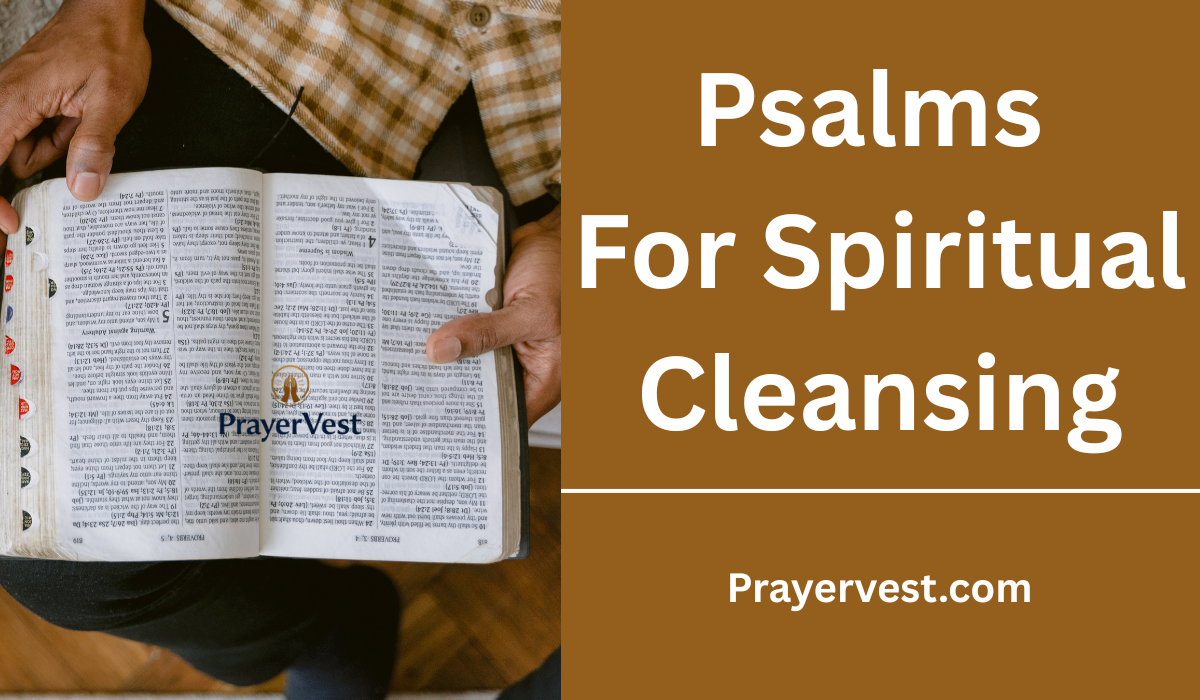

The Psalms offer divinely inspired language for each journey, whether your goal is to cleanse your soul from spiritual lethargy, break free from sinful patterns, or get ready for a closer relationship with God. They purify our identities from the inside out, bringing clarity, tranquility, and spiritual closeness back. These Psalms serve as invitations to enter the cleansing waters of grace, where people’s hearts are transformed, their minds are revitalized, and their lives are brought into alignment with God’s will. Let them serve as your songs of return, your screams, and your prayers.
50 Powerful Psalms For Spiritual Cleansing (2026)
1. Psalm 51:2
“Wash me thoroughly from my iniquity, and cleanse me from my sin!”
This heartfelt plea from David, after his fall with Bathsheba, is a raw confession of guilt and an earnest cry for divine purification. He doesn’t merely seek forgiveness—he yearns for complete spiritual renewal. David recognizes that true cleansing goes beyond external rituals; it must penetrate the heart and soul. His prayer is not just to be absolved, but to be transformed from within.
Reflection
Spiritual cleansing begins with honesty before God. David’s vulnerability teaches us that the pathway to healing isn’t through denial but confession. Our souls often carry the residue of sin, shame, and regret, but God offers a cleansing that reaches into the deepest crevices of our hearts. No matter how stained we feel, His mercy is potent enough to make us whiter than snow. When we come broken and repentant, we encounter a God not of condemnation but of restoration.
2. Psalm 119:9
“How can a young man keep his way pure? By guarding it according to your word.”
This verse reveals that purity isn’t accidental—it’s intentional. The psalmist highlights God’s Word as the guiding force for a cleansed life. Spiritual cleansing is not just a one-time experience but an ongoing practice of aligning our thoughts, actions, and desires with divine truth. The Word of God is not just informational—it’s transformational.
Reflection
In a world full of distractions and moral ambiguity, maintaining a pure heart demands vigilance and surrender to God’s Word. Scripture doesn’t just point out our faults; it provides the power to overcome them. Immersing ourselves in the Word saturates our minds with holiness and shapes our inner compass. If we desire spiritual cleansing, we must cling to the Scriptures as the river that washes us daily.
3. Psalm 19:12
“Who can discern his errors? Declare me innocent from hidden faults.”
Here, the psalmist acknowledges a sobering reality: not all sin is visible. Some sins lie buried beneath layers of pride, habit, or ignorance. This verse reflects a deep spiritual maturity—a longing to be cleansed not just from what is known, but also from what is hidden. It’s a humble recognition of our need for divine inspection.
Reflection
Spiritual cleansing requires more than confessing obvious wrongs—it calls for an openness to divine examination. Like a surgeon’s scalpel, God’s Spirit reveals the inner defects we can’t see. When we ask Him to expose and cleanse even our hidden faults, we invite a deeper, lasting sanctification. This vulnerability is not weakness—it is wisdom. True holiness involves surrendering every corner of our hearts to God’s purifying light.
4. Psalm 24:3-4
“Who shall ascend the hill of the Lord? And who shall stand in his holy place? He who has clean hands and a pure heart…”
This verse sets a divine standard for approaching God’s holy presence: cleanliness of both actions and intentions. “Clean hands” refer to external integrity, while a “pure heart” speaks of inward sincerity. God doesn’t just examine our behavior; He sees our motives. Spiritual cleansing, therefore, is both outward and inward.
Reflection
As we long to dwell with God, we must consider the condition of our inner and outer lives. The climb toward spiritual maturity is not achieved by outward appearances, but by inward transformation. This Psalm reminds us that God values purity not for perfection’s sake, but because it creates a space where His presence can dwell richly. When we seek His holiness, He cleanses and prepares us to stand in awe before Him.
5. Psalm 139:23-24
“Search me, O God, and know my heart! Try me and know my thoughts! And see if there be any grievous way in me, and lead me in the way everlasting!”
This courageous prayer invites God to perform an internal audit of the soul. Rather than hiding from conviction, the psalmist surrenders to divine inspection. He desires not just forgiveness, but transformation—a redirection onto the path of eternal life.
Reflection
Asking God to search us is an act of bold surrender. It’s an acknowledgment that we cannot cleanse ourselves. Spiritual renewal happens when we stop managing appearances and start inviting God into every corner of our hearts. His love does not shame us; it shapes us. His inspection doesn’t expose us to humiliation but to healing. In His hands, even our flaws become starting points for growth.
6. Psalm 32:5
“I acknowledged my sin to you, and I did not cover my iniquity… and you forgave the iniquity of my sin.”
David recounts his journey from silence to confession, highlighting the freedom that comes when sin is brought into the light. Concealment only breeds torment, but confession opens the floodgates of mercy. God’s forgiveness is not delayed—it is immediate and full.
Reflection
Spiritual cleansing is not a transaction—it’s a release. When we finally stop hiding and speak honestly with God, we experience the gentle power of His forgiveness. We are not meant to carry guilt; we are meant to lay it down. In confession, the soul breathes again. The grace of God rushes in like a healing tide, cleansing the residue of regret and renewing the joy of salvation.
7. Psalm 51:10
“Create in me a clean heart, O God, and renew a right spirit within me.”
This iconic verse expresses a deep yearning for spiritual rebirth. David doesn’t ask for minor correction but for a creative miracle—a new heart. He understands that cleansing is not behavior modification but a re-creation from the inside out.
Reflection
Sometimes our hearts feel too damaged to fix, but God specializes in making all things new. This verse reminds us that we don’t just need patchwork healing—we need divine transformation. When we invite God to create in us something entirely new, He responds with grace, not reluctance. He breathes fresh life into the discouraged, the weary, and the sinful, crafting hearts that beat with purity and purpose.
8. Psalm 66:18
“If I had cherished iniquity in my heart, the Lord would not have listened.”
This verse delivers a sobering truth: unrepentant sin can hinder our prayers. When we harbor sin, it creates distance between us and God. Spiritual cleansing, therefore, is not just for guilt relief—it’s essential for open communion with the Lord.
Reflection
Cherishing sin while seeking God is like trying to breathe underwater—it doesn’t work. Cleansing clears the line of communication between us and heaven. When we let go of our hidden compromises, we experience the closeness of a God who longs to listen. Repentance is not rejection; it’s the invitation to intimacy restored. God does not turn away from the humble—He draws near.
9. Psalm 86:5
“For you, O Lord, are good and forgiving, abounding in steadfast love to all who call upon you.”
This verse centers cleansing in the character of God. His goodness, forgiveness, and loyal love form the foundation upon which we seek renewal. Spiritual cleansing is not earned—it is received from a God eager to forgive.
Reflection
Sometimes we hesitate to seek forgiveness because we misunderstand God’s nature. But the psalmist anchors our hope in His abounding love. God’s forgiveness is not limited or reluctant—it overflows. He welcomes those who call upon Him, no matter how stained or unworthy they feel. His cleansing is not just thorough—it is tender. It washes, restores, and embraces.
10. Psalm 34:18
“The Lord is near to the brokenhearted and saves the crushed in spirit.”
Spiritual cleansing often begins in brokenness. This verse assures us that God is not repelled by our failures; He draws closer to us in them. When the weight of sin has broken us, He meets us with comfort and salvation.
Reflection
When we’re crushed under guilt or grief, it’s easy to believe we’re disqualified from God’s presence. But Scripture declares the opposite—He is near. Cleansing does not require strength; it simply requires surrender. God specializes in lifting those who have nothing left to give. In our weakest moments, His mercy becomes most evident. Let your brokenness become an altar where He begins the beautiful work of restoration.
11. Psalm 73:26
“My flesh and my heart may fail, but God is the strength of my heart and my portion forever.”
The psalmist acknowledges human weakness but clings to divine strength. Though the body and heart may falter, God’s strength is steady and eternal. Cleansing often begins when we stop trusting in ourselves and rest in God’s sufficiency.
Reflection
True cleansing comes when we reach the end of ourselves and discover God is still there. Our efforts to be pure, righteous, or strong will always fall short. But God, in His faithfulness, becomes our enduring portion. He doesn’t just fix us—He fills us. When everything in us fails, He remains unshaken, offering strength, wholeness, and spiritual stability.
12. Psalm 103:12
“As far as the east is from the west, so far does he remove our transgressions from us.”
This poetic assurance of God’s forgiveness portrays the infinite distance between our sin and our cleansed state. Once God forgives, He doesn’t keep score or bring it back. He removes our guilt completely.
Reflection
One of the most liberating truths of spiritual cleansing is this: forgiven means forgotten. When God removes our sin, He does so with finality. Shame often tries to remind us of what God has already erased. But His grace rewrites our story. The east and west will never meet—and neither will our sins once they are cleansed by His mercy. Walk in that freedom. You are no longer who you were.
13. Psalm 6:2
“Be gracious to me, O Lord, for I am languishing; heal me, O Lord, for my bones are troubled.”
This cry for mercy stems from deep anguish—physical, emotional, and spiritual. The psalmist doesn’t hide his distress but pleads for healing in the place of brokenness. Cleansing often includes the healing of wounds unseen by others.
Reflection
There are seasons where our need for cleansing is accompanied by sorrow and exhaustion. In such times, we need not pretend before God. His grace meets us in weakness. He doesn’t despise our groans—He heals them. When sin, grief, or weariness trouble our bones, God responds with mercy that refreshes both body and soul.
14. Psalm 40:2
“He drew me up from the pit of destruction, out of the miry bog, and set my feet upon a rock, making my steps secure.”
This verse describes the rescue of a soul from despair and instability. Spiritual cleansing isn’t just about removing sin—it’s about establishing stability and direction. God lifts us from our lowest points and gives us solid ground to stand on.
Reflection
Sometimes spiritual filth feels like a pit—deep, dark, and sticky. But God reaches into our mire and sets us on a rock. His cleansing doesn’t just restore—it repositions. We don’t just get cleaned; we get a new footing. God’s grace gives us back our balance and helps us walk again with strength and purpose.
15. Psalm 51:7
“Purge me with hyssop, and I shall be clean; wash me, and I shall be whiter than snow.”
Hyssop was used in ceremonial cleansing rituals, symbolizing purification from sin. David draws from this imagery to express his longing for spiritual and moral renewal. His faith is not in his ability to change, but in God’s power to cleanse.
Reflection
This is a prayer of confident humility. David doesn’t just ask to feel better—he asks to be made better. The imagery of being “whiter than snow” reflects not only forgiveness, but a total transformation. No matter how deep the stain, God can purify us beyond recognition. Spiritual cleansing through Christ isn’t partial—it’s complete, radiant, and irreversible.
16. Psalm 143:10
“Teach me to do your will, for you are my God! Let your good Spirit lead me on level ground!”
This verse shows that cleansing is not just about what we are forgiven from, but what we are formed into. The psalmist expresses a deep desire to be taught and led by God’s Spirit, recognizing that true spiritual renewal leads to a life aligned with divine will.
Reflection
Spiritual cleansing isn’t an endpoint—it’s a new beginning. Once our hearts are washed, we must be guided into righteous living. God’s Spirit not only cleanses but leads. He doesn’t leave us wandering but sets us on level ground, stable and secure. Ask Him to not only forgive but to form you into someone who walks in step with His purposes.
17. Psalm 26:2
“Prove me, O Lord, and try me; test my heart and my mind.”
Here, the psalmist submits himself to divine testing, not out of pride but from a sincere desire to live blamelessly. He invites God to examine the depths of both heart and mind—an act of spiritual vulnerability and a pursuit of integrity.
Reflection
Spiritual cleansing often requires courage—the courage to be searched by God. To ask for testing is to desire not just forgiveness, but growth. It means wanting to know what’s hidden and needing God to purify it. Don’t be afraid to invite God into your thoughts and motives; His truth won’t shame you—it will sanctify you.
18. Psalm 119:133
“Keep steady my steps according to your promise, and let no iniquity get dominion over me.”
This verse acknowledges the need for ongoing divine help to stay on the path of righteousness. Spiritual cleansing is not just a moment of grace, but a lifelong walk of surrender. The psalmist asks not just to be forgiven, but to be preserved from future bondage.
Reflection
Once cleansed, the soul must be guarded. We cannot walk in purity by our strength. Sin is always crouching at the door, but God’s Word can anchor us. When we walk by His promises, we walk in freedom. Spiritual cleansing is sustained through continuous dependence, not independence.
19. Psalm 141:3-4
“Set a guard, O Lord, over my mouth; keep watch over the door of my lips! Do not let my heart incline to any evil…”
The psalmist seeks protection not only from external threats but from internal corruption. He recognizes the link between the heart and the tongue—both must be submitted to God for true cleansing to occur.
Reflection
Sometimes what needs cleansing most is not just our past but our patterns—how we speak, think, and react. This prayer is a cry for discipline, a desire to be kept clean by divine help. Ask God to guard your words and your heart, and you’ll find that holiness begins to show up even in your smallest choices.
20. Psalm 15:1-2
“O Lord, who shall sojourn in your tent? Who shall dwell on your holy hill? He who walks blamelessly and does what is right…”
The psalmist lists the attributes of those who may live in God’s presence, emphasizing blamelessness and righteousness. Spiritual cleansing is the qualification for intimacy with God—it prepares us to dwell with Him.
Reflection
We all long to dwell in the presence of God, but that dwelling requires a clean and humble heart. This psalm reminds us that spiritual cleansing isn’t about ritual—it’s about character. God invites us into His sacred presence, not as perfect people, but as those who seek His purification daily.
21. Psalm 38:18
“I confess my iniquity; I am sorry for my sin.”
A brief but powerful admission of guilt and sorrow, this verse reflects the heart posture God honors. It shows that cleansing is not merely about words, but about a heart broken over sin and longing for restoration.
Reflection
True cleansing doesn’t happen in denial—it begins with confession. Sorrow over sin is not self-pity but a recognition of our deep need for God’s mercy. Don’t rush past confession. Sit in it. Let it draw you nearer to the Savior who cleanses not with condemnation, but with compassion.
22. Psalm 34:5
“Those who look to him are radiant, and their faces shall never be ashamed.”
This verse shows the transformational power of turning to God. Looking to Him not only brings help but also brings a radiant countenance—one free from the stain and shame of sin.
Reflection
Shame can cling to us long after we’ve been forgiven. But those who look to the Lord are made radiant—not because of their perfection, but because of His grace. Spiritual cleansing restores joy, light, and beauty to the soul. Lift your eyes. He will lift your face.
23. Psalm 30:2
“O Lord my God, I cried to you for help, and you have healed me.”
This verse blends the cry for help with a declaration of healing. The psalmist acknowledges that God responds not just to physical sickness, but to the soul’s cries for cleansing and restoration.
Reflection
Healing and cleansing often go hand in hand. When we cry out to God with honesty and desperation, He does not delay. He restores what is broken, cleanses what is unclean, and lifts what is weighed down. Trust His timing—He is still the God who heals when we call.
24. Psalm 19:14
“Let the words of my mouth and the meditation of my heart be acceptable in your sight, O Lord, my rock and my redeemer.”
This beautiful benediction expresses a desire for purity in both speech and thought. The psalmist seeks more than outward obedience—he wants inward acceptability before God.
Reflection
Cleansing is not only about what we stop doing—it’s about who we are becoming. When our thoughts and words align with God’s holiness, we begin to live as offerings to Him. May every part of you—visible and invisible—reflect a life surrendered and purified by grace.
25. Psalm 85:6
“Will you not revive us again, that your people may rejoice in you?”
This verse is a plea for revival—a renewal that brings joy and spiritual vitality. Revival always begins with cleansing, as hearts are softened and sin is removed to make room for divine joy.
Reflection
Spiritual cleansing prepares the soil for revival. Before joy returns, sin must be uprooted. This prayer is not about going back to the way things were, but about becoming new. Ask God to revive your soul, to breathe fresh life where there has been stagnancy, and to flood your heart with joy rooted in holiness.
26. Psalm 119:11
“I have stored up your word in my heart, that I might not sin against you.”
This verse reveals the protective power of Scripture. By storing God’s Word deep within, we guard our hearts against the return of sinful patterns. Cleansing is sustained through scriptural saturation.
Reflection
A cleansed heart must be filled, or it risks becoming empty and vulnerable. Let God’s Word fill the space where sin once dwelled. Meditate on His truth, and you will find that temptation loses its grip. Scripture doesn’t just inform—it protects, strengthens, and keeps us walking in the light.
27. Psalm 147:3
“He heals the brokenhearted and binds up their wounds.”
God is not distant from our pain—He draws near and tends to our wounds. Spiritual cleansing is often accompanied by the healing of emotional and spiritual scars.
Reflection
Some wounds are too deep for human help. But God is the healer of hearts and the binder of wounds. When cleansing feels painful, remember it’s also healing. He does not ignore our brokenness—He tenderly restores it. Every scar He touches becomes a testimony of grace.
28. Psalm 71:1
“In you, O Lord, do I take refuge; let me never be put to shame!”
This is a prayer for protection, both from external attack and internal shame. Cleansing not only removes sin but replaces it with a new covering: the righteousness and refuge of God.
Reflection
Shame tries to define us by our past. But when we hide in God, we find a new identity. His cleansing strips away the labels we’ve carried and clothes us with dignity and worth. Refuge in Him means we never have to return to shame again. He is our safe place and our new name.
29. Psalm 33:22
“Let your steadfast love, O Lord, be upon us, even as we hope in you.”
This verse ties the experience of God’s love to the act of hopeful expectation. It reminds us that cleansing is always followed by fresh mercy, as we place our trust in His unwavering love.
Reflection
After cleansing comes covering—God’s steadfast love. He doesn’t just remove the stain; He wraps us in grace. When we hope in Him, we open ourselves to a daily overflow of His mercy. His love is not just the beginning of cleansing—it’s the atmosphere in which we are sustained.
30. Psalm 25:11
“For your name’s sake, O Lord, pardon my guilt, for it is great.”
This verse captures the humility of a soul overwhelmed by sin, yet fully dependent on God’s mercy. The psalmist appeals not to his worthiness, but to God’s name and nature.
Reflection
Even when your guilt feels unbearable, God’s grace is greater. Spiritual cleansing is never earned—it’s always granted for His name’s sake. When you come broken, you honor His mercy. When you trust His forgiveness, you glorify His grace. Come boldly—not because you’re good, but because He is.
31. Psalm 31:1-2
“In you, O Lord, do I take refuge; let me never be put to shame; in your righteousness deliver me! Incline your ear to me; rescue me speedily!”
The psalmist cries for deliverance not based on his merit, but on God’s righteousness. He places full trust in the Lord’s power to rescue, cleanse, and cover him in righteousness instead of shame.
Reflection
We often try to cleanse ourselves through effort, reputation, or denial. But David reminds us that God’s righteousness—not ours—is our deliverance. When we lean into His righteousness, we are not only forgiven but shielded from shame. You don’t have to be perfect to be purified; you only have to trust in the One who is.
32. Psalm 65:3
“When iniquities prevail against me, you atone for our transgressions.”
This verse captures the beauty of grace in the face of overwhelming sin. When our iniquities multiply and seem to win, God steps in as the one who atones and brings cleansing.
Reflection
There will be times when sin feels like a flood. But even then, God’s mercy rises higher. This verse is a lifeline to those who feel overpowered by guilt. Spiritual cleansing doesn’t depend on our ability to conquer sin—it depends on His ability to cover it. And He always does.
33. Psalm 18:16
“He sent from on high, he took me; he drew me out of many waters.”
David testifies of God’s rescue from overwhelming circumstances—symbolized by deep, chaotic waters. This act of deliverance is a powerful image of spiritual cleansing and renewal.
Reflection
Sin, shame, and regret often feel like drowning. But God reaches into our chaos and lifts us out. His rescue is not hesitant—it is intentional and immediate. He doesn’t leave us to sink; He pulls us into safety, into cleansing, into grace.
34. Psalm 90:8
“You have set our iniquities before you, our secret sins in the light of your presence.”
This sobering verse acknowledges that nothing is hidden from God. Even our secret sins are fully exposed in His light—a light not meant to shame, but to cleanse.
Reflection
Spiritual cleansing begins when we stop hiding. God already sees what we cover. But the beauty of His presence is that He reveals in order to heal. When His light exposes our darkness, it’s not for condemnation but for freedom. Don’t fear the light—step into it and be made new.
35. Psalm 79:9
“Help us, O God of our salvation, for the glory of your name; deliver us, and atone for our sins, for your name’s sake!”
This plea ties God’s cleansing work directly to His glory. It’s not only about personal freedom from sin but about honoring God’s holy name through transformation.
Reflection
Your cleansing is not just for your benefit—it glorifies the God who saves. When He forgives, it magnifies His mercy. When He transforms, it showcases His power. Seek forgiveness not only to feel better, but to glorify the One who loves you relentlessly and redeems you fully.
36. Psalm 80:3
“Restore us, O God; let your face shine, that we may be saved!”
This chorus of revival is repeated throughout Psalm 80. The psalmist longs not only for restoration but for the return of God’s shining presence—a symbol of favor and purification.
Reflection
When God’s face shines on us, darkness flees. His presence restores, revives, and renews. Spiritual cleansing isn’t just the removal of sin; it’s the return of divine radiance. Pray for His face to shine on your soul again. His light brings life.
37. Psalm 130:3-4
“If you, O Lord, should mark iniquities, O Lord, who could stand? But with you there is forgiveness, that you may be feared.”
The psalmist acknowledges the impossibility of standing before God if every sin were counted. Yet, he highlights the wonder of forgiveness—a gift that leads to reverent awe.
Reflection
God’s forgiveness is not casual—it is awe-inspiring. When we realize how holy He is and how merciful He chooses to be, our only response is reverence. Spiritual cleansing should not lead to complacency, but to worship. Stand in holy fear—not of punishment, but of grace.
38. Psalm 51:17
“The sacrifices of God are a broken spirit; a broken and contrite heart, O God, you will not despise.”
This verse reveals what God truly desires: not external offerings, but internal humility. A broken and contrite heart is the vessel through which cleansing and restoration flow.
Reflection
When you come to God in shatters, He does not turn away. Brokenness is the offering He most desires. Spiritual cleansing doesn’t require perfection—it requires contrition. Let your broken heart be your worship, and let His mercy be your healing.
39. Psalm 25:7
“Remember not the sins of my youth or my transgressions; according to your steadfast love remember me, for the sake of your goodness, O Lord!”
David pleads for mercy rooted in God’s love, not his merit. He asks God to forget past failures and instead remember him in love and goodness.
Reflection
Regret over the past can be heavy, but God’s love is stronger than your history. When He cleanses you, He rewrites how Heaven remembers you. He does not define you by your worst moments. Ask Him to remember you through the lens of His love—not your mistakes.
40. Psalm 27:4
“One thing have I asked of the Lord… that I may dwell in the house of the Lord all the days of my life…”
The psalmist longs to dwell in God’s presence forever. Dwelling with God requires spiritual cleanliness, but it also produces it. His house is a sanctuary of ongoing renewal.
Reflection
Cleansing is not just preparation for God’s presence—it is the result of it. When we dwell with Him, His holiness rubs off on us. This verse teaches us to long for nearness over performance. Abide in Him, and you’ll find the purity you seek.
41. Psalm 6:4
“Turn, O Lord, deliver my life; save me for the sake of your steadfast love.”
David cries for deliverance not based on personal merit but on God’s unchanging love. He appeals to God’s character as the reason for salvation and renewal.
Reflection
When you’re unsure what to pray, lean on His love. It never changes, never fails, never ends. Your cleansing is not earned—it’s given freely for love’s sake. God’s steadfast love is your plea, your anchor, and your hope.
42. Psalm 103:3
“Who forgives all your iniquity, who heals all your diseases…”
This verse highlights God’s total care for the human soul—He forgives all sin and heals all affliction. Spiritual cleansing and inner healing go hand in hand.
Reflection
God doesn’t just partially forgive or selectively cleanse. His mercy is all-encompassing. When He moves, He restores everything—your soul, your mind, your story. Let Him do the complete work. Don’t settle for partial healing when He offers total restoration.
43. Psalm 40:12
“For evils have encompassed me beyond number… my iniquities have overtaken me, and I cannot see…”
David describes the overwhelming weight of sin and spiritual blindness. Yet this confession sets the stage for cleansing and divine intervention.
Reflection
There are seasons when sin feels like it’s swallowed us whole. But even then, God is not far. When you feel lost in your guilt, remember: the one who forgave David still forgives today. Confession clears the fog and makes way for mercy.
44. Psalm 116:1
“I love the Lord, because he has heard my voice and my pleas for mercy.”
The psalmist responds to God’s attentive mercy with deep love. Cleansing leads not only to freedom but to affection—a renewed relationship with the One who listens and forgives.
Reflection
When you experience real cleansing, love naturally follows. It’s impossible to be touched by mercy and remain indifferent. Let your gratitude turn into worship. Love Him—not to earn His favor, but because He has already poured it out.
45. Psalm 34:22
“The Lord redeems the life of his servants; none of those who take refuge in him will be condemned.”
This verse declares the finality of redemption and the absence of condemnation for those who run to God. Spiritual cleansing ends in security, not fear.
Reflection
There is no condemnation for the one who takes refuge in God. Let that truth sink in. No matter your past, your refuge in Him guarantees your freedom. Redemption is not temporary—it is total. Rest in that assurance.
46. Psalm 84:11
“No good thing does he withhold from those who walk uprightly.”
God generously blesses those who walk in integrity and purity. This verse shows that spiritual cleansing unlocks divine favor—not as a reward, but as a reflection of God’s goodness.
Reflection
When you’re cleansed, you’re positioned to receive. God withholds no good thing from a purified heart. Seek purity not to get something, but because in Him, you already have everything. His favor follows those who walk in His ways.
47. Psalm 91:14
“Because he holds fast to me in love, I will deliver him; I will protect him, because he knows my name.”
This promise shows the connection between love, trust, and divine rescue. Cleansing leads to intimacy, and intimacy brings protection.
Reflection
Spiritual cleansing binds us to God in love. When you cling to Him, He delivers. When you trust in His name, He covers you. There’s no greater security than a heart made clean and held close to God.
48. Psalm 145:8-9
“The Lord is gracious and merciful, slow to anger and abounding in steadfast love. The Lord is good to all…”
These verses celebrate the foundational truths of God’s character—grace, mercy, patience, and love. Spiritual cleansing flows from this heart of goodness.
Reflection
You can come confidently to God for cleansing because He is not waiting to punish—He’s longing to forgive. He delights in mercy. Let His character give you boldness to ask for cleansing again and again.
49. Psalm 55:22
“Cast your burden on the Lord, and he will sustain you; he will never permit the righteous to be moved.”
Spiritual cleansing includes unburdening the soul. This verse offers assurance that God not only forgives but sustains.
Reflection
Let go of what you’ve been carrying. Guilt, shame, regret—they don’t belong in a cleansed heart. When you cast them on the Lord, He replaces them with strength and stability. His sustaining grace keeps you standing.
50. Psalm 63:1
“O God, you are my God; earnestly I seek you; my soul thirsts for you… in a dry and weary land where there is no water.”
This final verse shows the longing of a soul that recognizes its deep need for God. Cleansing is not the end—it’s the beginning of a deeper thirst for His presence.
Reflection
A cleansed soul becomes a thirsty soul—desperate for more of God. Let your cleansing lead you into deeper pursuit. He satisfies like no one else. In the dryness of this world, His presence becomes living water to a purified heart.
Conclusion
We are reminded as we read these potent Psalms that spiritual cleaning is a continuous return to God’s presence rather than a one-time occurrence. According to the Psalms, God accepts a shattered and repentant heart as an offering rather than rejecting it. These holy melodies give expression to our deepest desires and lead us toward the renewing power of grace, regardless of whether we are troubled by guilt, preoccupied with material worries, or just yearn for a new beginning. Freedom—freedom from spiritual heaviness, from shame, and from anything that separates us from God’s heart—gets closer with every verse.
Allow these Psalms to influence your everyday walk with God and to serve as inspiration for your prayers. Incorporate them into your spiritual routine by reflecting on them, praying through them, and letting their truth permeate your spirit. The Word of God is our purifying stream in a world that is always trying to contaminate our hearts and thoughts. May you feel the quiet strength of a soul healed by God’s loving hands, the confidence of forgiveness, and the purifying joy of repentance as you absorb these verses.



